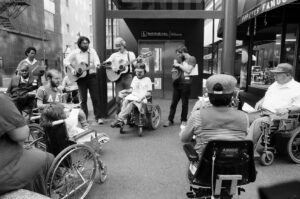Today, ADAPT is a grassroots disability rights organization that organizes nonviolent direct action and acts of civil disobedience to fight for the civil and human rights of people with disabilities. But when ADAPT began in 1983 it stood for Americans Disabled for Accessible Public Transit, with a specific focus on wheelchair accessibility on public buses.
The first protests took place in Denver in July 1978, but throughout the 1980s, the campaign for bus lifts expanded to cities across the country, including Chicago. On August 25, 1984, wheelchair users of ADAPT held a rally at South State and West Jackson Streets to pressure the Chicago Transit Authority (CTA) to install wheelchair lifts on its mainline buses. Disability activists continued to disrupt CTA board meetings and block CTA buses, and in 1985, ADAPT sued the CTA for discrimination.


Wheelchair users of ADAPT gather for a rally at South State and West Jackson Streets, Chicago, to pressure the CTA to install wheelchair lifts, August 25, 1984. ST-20001256-0014 (above), ST-20001256-0006 (below), Chicago Sun-Times collection, Chicago History Museum
Finally in 1988, a judge ruled that the CTA’s “Dial-A-Ride” service was not an adequate alternative to accessible buses, and that year, the CTA board voted to equip more than 500 new buses with wheelchair lifts. The victory in Chicago was encouraging, but activists wanted stronger laws passed at the federal level that would not only give them access to transportation but to jobs, housing, and education. ADAPT continued to protest and demand that Congress pass the Americans with Disabilities Act (ADA). Their actions included a march from the White House to the Capitol in Washington, DC, on March 12, 1990.
President George H. W. Bush signed the ADA into law on July 26, 1990. The legislation “prohibits discrimination against people with disabilities in several areas, including employment, transportation, public accommodations, communications and access to state and local government programs and services.”
ADAPT’s work to improve access to public transportation is only part of its platform of community for all, where all people can live, move, and participate in ways that recognize and support individual dignity and freedom. This includes eliminating barriers to things like work, health care, and disaster relief, but also changing the way disability is thought of, so disabled lives are seen as having value. A focus of ADAPT Chicago’s work has been on housing, specifically the right to live in one’s home rather than a nursing home.


Protestors from ADAPT block an entrance to the U.S. Health and Human Services department on West Adams Street, in response to a lack of government funds allowing people with disabilities to live at home, Chicago, May 11, 1992. ST-30002316-0042 (above), ST-30002316-0066 (below), Chicago Sun-Times collection, Chicago History Museum
The independent living (IL) movement has been at the cornerstone of the disability rights movement in the United States since the 1960s. IL developed in response to people with disabilities being routinely institutionalized and separated not only from society but from making their own choices. The IL movement asks for the recognition that people with disabilities are the experts on their own needs, with the point not that they don’t need some assistance, but that they should be making decisions for themselves.
ADAPT continues its work to advocate for services, legislative policy changes, grassroots education and mobilization through rallies, sit-ins, protests, campaigns, and national field events. They also continue to advocate for transportation access. Most recently, in 2016, during an event marking the 25th anniversary of the Americans with Disabilities Act, CTA President Dorval R. Carter Jr. announced a plan make all 145 elevated and subway rail stops in the city wheelchair accessible by 2038. You can track the progress on the CTA’s website.
Additional Resources
- See more images from ADAPT’s protests in Chicago at CHM Images
- Find research materials using CHM’s Disability Research Guide
- Listen to Studs Terkel’s interview with Susan Nussbaum, founder of Access Living, and Michael Pachovas, founder of Disabled Prisoners Program, about the Disabled Persons Freedom Rally held in 1981